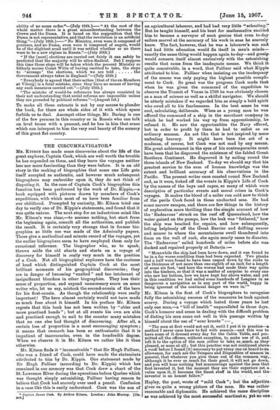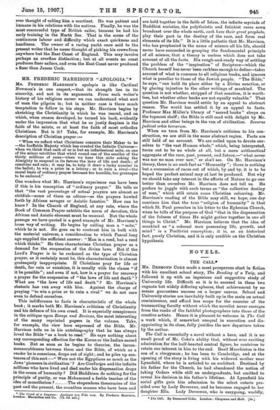THE CIRCUMNAVIGATOR.*
XL KITSON has made some discoveries about the life of the great explorer, Captain Cook, which are well worth the trouble he has expended on them, and they leave the voyages neither less nor more fascinating than they were before. It is an old story in the making of biographies that some one Life gets itself accepted as authentic, and however much subsequent biographers may embroider upon it, they do not think of disputing it. In the case of Captain Cook's biographies this function has been performed by the work of Dr. Kippis,—a book equipped with pictures drawn by members of Cook's expeditions, with which most of us have been familiar from our childhood. Prompted by curiosity, Mr. Kitson tried one day to verify one of Dr. Kippis's statements, and found that it was quite untrue. The next step for an industrious mind like Mr. Kitson's was clear,—to assume nothing, but start from the beginning again, consult all the authorities, and publish the result. It is certainly very strange that in former bio- graphies so little use was made of the Admiralty papers. These give a methodical and minute record of the voyages, yet the earlier biographers seem to have employed them only for occasional reference. The biographer who, so to speak, throws aside the old charts and starts on a voyage of discovery for himself is really very much in the position of a Cook. Not all biographical explorers have the coolness of head which distinguished Captain Cook at the most brilliant moments of his geographical discoveries ; they are in danger of becoming "exalted" and too intolerant of insignificant blunders in other biographies. They lose their sense of proportion, and expend unnecessary scorn on some writer who, let us say, mistook the second-cousin of the hero for his first-cousin. As though the relationship were really important! The hero almost certainly would not have made so much fuss about it himself. In his preface Mr. Kitson regrets that this book has not been written by "abler and more practised hands " ; but at all events his own are able and practised enough to nail to the counter many mistakes that no one else had thought of discovering. After all, a certain loss of proportion is a most encouraging symptom ; it means that research has been so enthusiastic that it is impatient of inaccuracies, even in the hundredth agree. When we observe it in Mr. Kitson we rather like it than otherwise.
Mr. Kitson finds it " inconceivable " that Sir Hugh Palliser, who was a friend of Cook, could have made the statements attributed to him by Dr. Kipple. One statement made by Sir Hugh Palliser (according to Dr. Kippis) which has remained in our memory was that Cook drew a chart of the St. Lawrence Hirer during the operations before Quebec which was thought simply astonishing, Palliser having reason to believe that Cook had scarcely ever used a pencil. Confusion in a case like this is easily understood. Cook was the son of • Captain Jar.. Cook. By Arthur Kitaon. London: John Murray. (15a. Bet.) an agricultural labourer, and had had very little "schooling.' But he taught himself, and his bent for mathematics enabled: him to become a surveyor of such genius that even to-day sailors marvel at the accuracy of his work in seas he scarcely knew, The fact, however, that he was a labourer's son and had had little education would fix itself in men's minds— exactly the same thing would happen again to-day—and gossip. would concern itself almost exclusively with the astonishing results that came from the inadequate means. We think it. quite conceivable, in a word, that Palliser said what Kipple attributed to him. Palliser when insisting on the inadequacy of the means was only paying the highest possible compli- ment to Cook. So great was the progress Cook made that when he was given the command of the expedition to observe the Transit of Venus in 1768 he was obviously chosen as a man of science as well as a skilful navigator. We should. be utterly mistaken if we regarded him as simply a bold spirit who owed all to his fearlessness. In the best sense he was. cool, calculating, deliberate. When as a young man be was. offered the command of a ship in the merchant • company ia which he had worked his way up from apprenticeship; he- refused it. He saw the opportunities the Navy offered, but in order to profit by them he had to enlist as an ordinary seaman. An act like that is not inspired by mere unfeeling bravery. It might have been the act of a. madman, of course, but Cook was not mad by any means.. His great achievement in the eyes of his contemporaries must have been that he disproved the existence of the fabled Great. Southern Continent. He disproved it by sailing round the three islands of New Zealand. To-day we should say that his greatest service to the sum of human knowledge was the extent and brilliant accuracy of his observations in the Pacific. The present writer once coasted round New Zealand. and, as it were, ticked off the events in Kippis's Life of Cook by the names of the bays and capes, so many of which were descriptive of particular events and moral crises in Cook's. voyages. It makes the blood of a sailor run cold now to think of the perils Cook faced in those uncharted seas. Be had some narrow escapes, and there are few things in the history of exploration more thrilling than the simple account of how the ' Endeavour ' struck on the reef off Queensland, how the water gained on the pumps, how the leak was "fothered," how the ship was beached for repairs, and how subsequently, lolling helplessly off the dreat Barrier and drifting nearer and nearer to where the mountainous swell thundered into. foam on the wall of rock, she again nearly came to disaster. The 'Endeavour' sailed hundreds of miles before she was. docked and repaired properly at Batavia Meanwhile the ship had been hove down, and it was found to. be in a far worse condition than had been expected. Two planks and a half were found to have been rasped down by the rocks to the thickness of not more than one-eighth of an inch for a length of some six feet, 'and here the worms had made their way quit° into the timbers, so that it was a matter of surprise to every one- who saw her bottom, how we have kept her above water, and yet. in this condition we had sailed some hundreds of Leagues in as: dangerous a navigation as in any part of the world, happy in being ignorant of the continual danger we were in."
Mr. Kitson is the first of Cook's biographers to recognise, fully the astonishing success of the measures he took against scurvy. During a voyage which lasted three years he lost only one mau,—a "bill of health" unparalleled in those days.. Cook's humour and sense in dealing with the difficult problem of dieting his men come out well in this passage written by himself about the use of "sour kraute " "The men at first would not eat it, until I put it in practice—a. method I never once knew to fail with seamen—and this was to have some of it dressed every day for the Cabin Table, and per- nutted all the officers, without exception, te, make use of it, and. left it to the option of the men either to take, as.Auch.aa .they- pleased, or none at all ; but this practice was not continued above- a week' before I found [it] necessaryto put every one on board to an 'allowance, for such are the Tempers and Disposition of seamen in. general, that Whatever you _give them- out of the Common. way,. although it be ever so much for their good, it will not go down, and you will hear nothing bta murmurings against the man that first invented it, but the moment they see their superiors set a . value upon it, it becomes the finest staff in the World, and the- inventor is an honest fellow."
Hayley, the poet, wrote of "mild Cook "; but the adjectide gives us quite a wrong picture of the man. He was rather reasonable and diplomatic. He achieved the same discipline as was achieved by the most successful martinets; yet no one. ever thought of calling him a martinet. He was patient and humane in his relations with the natives. Finally, he was the moat resourceful type of British sailor, because he had his early training in the North Sea. That is the scene of the continuous labour and difficulty which exact quickness and handiness. The owner of a racing yacht once said to the present writer that he never thought of picking his crews from anywhere but the East Coast of England. This may involve perhaps an overfine distinction; but at all events no coast produces finer sailors, and even the East Coast never produced a finer than James Cook.







































 Previous page
Previous page